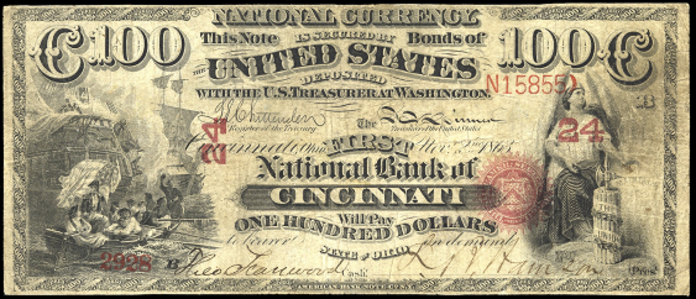One Hundred Dollar Notes › Nationals › 1863 One Hundred Dollar Original Series National Bank Notes › Indiana Charters › 1863 $100 Rochester Indiana First National Bank
Get Value Now
| Item | Info |
|---|---|
| Series | 1863 |
| Charter | #1952 First National Bank of Rochester, Indiana |
| Year Chartered | 1872, 61 Banks Chartered |
| City Info | Rochester is a city in, and the county seat of, Fulton County, Indiana, United States. The population was 6,218 at the 2010 census. Rochester was laid out in 1835. The founder Alexander Chamberlain named it for his former hometown of Rochester, New York. The Rochester post office was established in 1836. Source: Wikipedia |
| Similar Cities | If your note doesn't match try: 1. Rochester, New York - First National Bank 2. Rochester, Minnesota - First National Bank 3. Rochester, New York - Farmers and Merchants' National Bank 4. Rochester, New York - Traders' National Bank 5. Rochester, New York - National Union Bank 6. Rochester, Minnesota - Union National Bank 7. Rochester, New Hampshire - Rochester National Bank |
| Seal Varieties | Red with rays |
| See Also | If your note doesn't match try: 1. 1863 $100 Compound Interest Treasury Note 2. 1864 $100 Compound Interest Treasury Note 3. 1863 $100 Gold Certificate 4. 1861 $100 Interest Bearing Note 5. 1863 $100 Interest Bearing Note 6. 1864 $100 Interest Bearing Note |
| Other Info | 1. Value depends on notes known for charter, condition and market demand. |
| Neat Fact | 1-5 Digit Charter number critical to note identification. It is Red, Blue, Black or rarely absent altogehter. It is printed over the note design. |
No Obligations Offers and Appraisals
Please submit a good photo or scan. It will be identified and evaluated. Understand there may be subtle differences between the image you see above and your note. Signatures, design, markings and note condition will determine the offer price. Notes in Uncirculated or better condition receive the best offers.
Appraisals can be estimated for wholesale and retail prices. Wholesale is what dealers typically pay. Retail is what a collector might pay. Retail is slightly higher in most cases.
Please visit this page for USA Paper Money Reference. Do not treat this page as a reference guide, it is for appraisal and acquisition purposes only.
